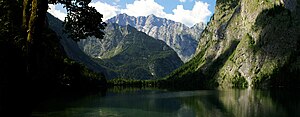Bavaria


Bavaria, officially the Free State of Bavaria, is a state in the southeast of Germany. With an area of 70,550.19 km2 (27,239.58 sq mi), it is the largest German state by land area, comprising approximately 1/5 of the total land area of Germany, and with over 13.08 million inhabitants, it is the second most populous German state, behind only North Rhine-Westphalia; however, due to its large land area, its population density is below the German average. Major cities include Munich (its capital and largest city, which is also the third largest city in Germany), Nuremberg, and Augsburg.
The history of Bavaria includes its earliest settlement by Iron Age Celtic tribes, followed by the conquests of the Roman Empire in the 1st century BC, when the territory was incorporated into the provinces of Raetia and Noricum. It became the Duchy of Bavaria (a stem duchy) in the 6th century AD following the collapse of the Western Roman Empire. It was later incorporated into the Holy Roman Empire, became the independent Kingdom of Bavaria after 1806, joined the Prussian-led German Empire in 1871 while retaining its title of kingdom, and finally became a state of the Federal Republic of Germany in 1949.
Bavaria has a distinct culture, largely because of its Catholic heritage and conservative traditions, which includes a language, cuisine, architecture, festivals and elements of Alpine symbolism. It also has the second-largest economy among the German states by GDP figures, giving it the status of a wealthy German region.
Contemporary Bavaria also includes parts of the historical regions of Franconia and Swabia, in addition to Altbayern. (Full article...)
Selected article

Munich (/ˈmjuːnɪk/ MEW-nik; German: München [ˈmʏnçn̩] ⓘ; Bavarian: Minga [ˈmɪŋ(ː)ɐ] ⓘ) is the capital and most populous city of the Free State of Bavaria, Germany. With a population of 1,604,384 inhabitants as of 30 November 2024, it is the third-largest city by population in Germany, after Berlin and Hamburg, and thus the largest which does not constitute its own state, as well as the 11th-largest city in the European Union. The Munich metropolitan area – including suburbs and satellite towns – has 3 million inhabitants; and the city's metropolitan region is home to about 6.2 million people and is the third largest metropolitan region by GDP in the European Union.
Straddling the banks of the river Isar north of the Alps, Munich is the seat of the Bavarian administrative region of Upper Bavaria, while being the most densely populated municipality in Germany with 4,500 people per km2. Munich is the second-largest city in the Bavarian dialect area, after the Austrian capital of Vienna. (Full article...)
Selected biography

Quotes
- Home is not where you live, but where they understand you.
Christian Morgenstern (poet)
- So certainly, if we can tell evil stories to make people sick, we can also tell good stories that make them well.
Rainer Werner Fassbinder (film director)
- Hopefully it won't be worse than it is already.
Selected image

Did you know?

- ...that there is a Bavarian citizenship (as opposed to a German citizenship)? Actually, the Bavarian constitution (Bavaria has a separate constitution that exists alongside the German constitution) explicitly provides for it in articles 6 and 7. Specifically, you become a Bavarian citizen by birth, by marriage or by being naturalized.
Subcategories
Topics
Related portals
Germany state portals
WikiProjects
Things to do

- Requested articles:
- Help assess articles supported by WikiProject Bavaria
- Help suggest content for usage in this portal by using the archive links to obtain instructions
- Write Bavarian topics if you see a redlink which is worthy of an article
- Cleanup and expand stub-class articles relating to Bavaria
Wikipedia in Bavarian languages
Associated Wikimedia
The following Wikimedia Foundation sister projects provide more on this subject:
-
Commons
Free media repository -
Wikibooks
Free textbooks and manuals -
Wikidata
Free knowledge base -
Wikinews
Free-content news -
Wikiquote
Collection of quotations -
Wikisource
Free-content library -
Wikiversity
Free learning tools -
Wikivoyage
Free travel guide -
Wiktionary
Dictionary and thesaurus











